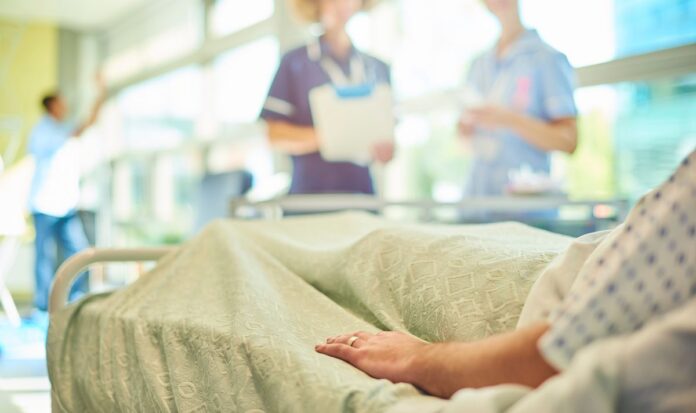The proportion of patients waiting too long in A&E reached record levels last month (Image: Getty)Almost 44,000 people were kept waiting for over 12 hours in England’s A&E departments last month – the highest ever.And 150,000 waited more than four hours. The proportion seen within that period fell below 70 per cent for the first time, against a 95 per cent target.Meanwhile, the mammoth backlog of planned operations and procedures swelled to a new peak of 7.1 million by the end of September.The total included more than 400,000 patients who had been waiting over a year, up from 387,000 a month earlier.And only 73 per cent of patients with suspected cancer saw a consultant within two weeks of an urgent referral in September, the lowest proportion ever seen.Dr Tim Cooksley, president of the Society for Acute Medicine, said: ‘Standards are at an unacceptably poor level for both patients and staff with an expectation that this will deteriorate further over the winter months.’Morale for patients and staff is low, with little expectation of short-term improvement. All parts of the NHS are unquestionably struggling.’The latest data came after the Royal College of Nursing (RCN) revealed nurses had voted to strike over pay at around half of NHS organisations balloted across the UK.Walk-outs that will see staff provide only a Christmas Day level of urgent care are set to begin before the end of the year and could drag on for six months.Patricia Marquis, RCN director for England, said the record waits and delays were ‘exactly why nursing has taken the historic decision to strike’.She added: ‘These pressures cannot continue. The waiting lists will only come down when there is proper investment in the workforce.’Steve Barclay met with RCN general secretary Pat Cullen yesterday (THURS) in an effort to prevent industrial action.The Health Secretary tweeted that it had been a ‘constructive meeting…covering a number of topics’.He added: ‘Nurses do an incredible job and I regret some union members have voted for strikes.’My priority is to keep patients safe and minimise disruption – my door is open and we have agreed to meet again shortly.’A source said the pair had also discussed patient safety, adding: ‘There was a lot of openness on both sides and willingness to keep talking.’It’s going to be difficult on pay but both sides seem to want to engage on the issues that concern nurses.’Writing in the Daily Express today, Women’s Minister and NHS nurse Maria Caulfield MP says she understands the challenges nurses have faced with their incomes.But she adds: ‘For me strike action is a step too far and perhaps other nurses feel that too with only around half of nurses in hospitals in England voting for strike action.’Matthew Taylor, chief executive of the NHS Confederation, said hospitals would work to ‘minimise harm to patients’ in the event of strikes.But he admitted operations and appointments would have to be cancelled or postponed.He said: ‘We’re already coping with the gap that exists between the demand that is currently on the health service from the public.’We’ve got to meet that demand, and we all know that we are heading into what already is a very difficult winter.’Then we add industrial action into that and it’s going to be an extremely difficult job. The priority will be to try to minimise patient harm.’ Nurses at half of NHS organisations balloted by the RCN voted to strike (Image: Getty)NHS England acknowledged the extreme pressures but said progress had been made on the backlog.The number of people waiting more than 18 months for treatment has fallen by almost 60 per cent in the last year, from 124,000 to 51,000.Last month was also the busiest October on record for A&E attendances with 2.17 million patients turning up.NHS medical director Professor Sir Stephen Powis said pressure on emergency care was now the third big threat for winter, describing it as a ‘tripledemic’.He said: ‘There is no doubt October has been a challenging month for staff who are now facing a tripledemic of Covid, flu and record pressure on emergency services.’Pressure on emergency services remains high as a result of more than 13,000 beds taken up each day by people who no longer need to be in hospital.’But staff have kept their foot on the accelerator to get the backlog down with 18-month waiters down by three-fifths on last year.’We have always said the overall waiting list would rise as more patients come forward, and with pressures on staff set to increase over the winter months, the NHS has a plan – including a new falls service, 24/7 war rooms and extra beds and call handlers.’Just 67 per cent received a diagnosis or all-clear within a recently introduced target of 28 days, the second-worst performance since April 2021.Steven McIntosh, of Macmillan Cancer Support, said the figures were ‘appalling’.He added: ‘Despite the very best efforts of NHS staff, delays to diagnosis and treatment can be incredibly traumatic for people living with cancer, causing huge amounts of anxiety and potentially impacting their chances of survival.’Health leaders also warned that thousands of hospital beds were being taken up by patients who should have been discharged to social care.An average of 13,600 patients remained in hospital every day in October despite being medically fit to leave.Miriam Deakin, director of policy and strategy, NHS Providers, said the NHS was facing its toughest ever winter.She added: ‘Pressure on social care and community services means that hospitals struggle to discharge people who’re well enough to leave.’That has a serious knock-on effect on available beds and admissions, and leaves ambulances waiting to hand over patients to hospitals, delaying them from further calls.’
Fears for patient safety in strikes as NHS sees worst performance in h
Sourceexpress.co.uk
RELATED ARTICLES


